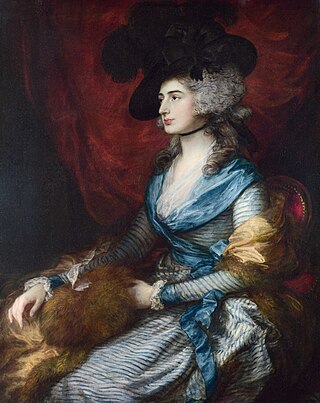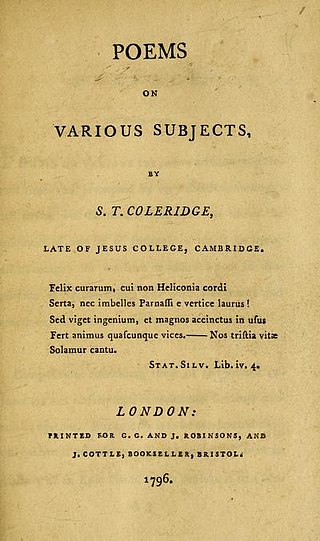Samuel Taylor Coleridge was born on 21 October 1772. The youngest of 14 children, he was educated after his father's death and excelled in classics. He attended Christ's Hospital and Jesus College, Cambridge. While attending college, he befriended two other Romanticists, Charles Lamb and Robert Southey, the latter causing him to eventually drop out of college and pursue both poetic and political ambitions.
Religious Musings was composed by Samuel Taylor Coleridge in 1794 and finished by 1796. It is one of his first poems of critical merit and contains many of his early feelings about religion and politics.
"To the River Otter" is a sonnet by Samuel Taylor Coleridge. Though its date of creation is uncertain, it was possibly composed in 1793. It deals with the image of the River Otter, near Coleridge's childhood home in Devon.
The Destiny of Nations was composed by Samuel Taylor Coleridge as part of Robert Southey's Joan of Arc epic poem. The lines were later isolated from Southey's and expanded. The new poem includes Coleridge's feelings on politics, religion, and humanity's duty to helping each other.
"This Lime-Tree Bower My Prison" is a poem written by Samuel Taylor Coleridge during 1797. The poem discusses a time in which Coleridge was forced to stay beneath a lime tree while his friends were able to enjoy the countryside. Within the poem, Coleridge is able to connect to his friend's experience and enjoy nature through him, making the lime tree only a physical prison, not a mental one.
To a Young Ass was composed by Samuel Taylor Coleridge in 1794. The poem describes Coleridge's sympathies for animals and the connection to nature he felt as part of his idea of Pantisocracy. It was later used by critics as a means to mock him.
Fears in Solitude, written in April 1798, is one of the conversation poems by Samuel Taylor Coleridge. The poem was composed while France threatened to invade Great Britain. Although Coleridge was opposed to the British government, the poem sides with the British people in a patriotic defense of their homeland. The poem also emphasizes a desire to protect one's family and to live a simple life in harmony with nature. The critical response to the poem was mixed, with some critics claiming that the work was "alarmist" and anti-British.
Sonnets on Eminent Characters or Sonnets on Eminent Contemporaries is an 11-part sonnet series created by Samuel Taylor Coleridge and printed in the Morning Chronicle between 1 December 1794 and 31 January 1795. Although Coleridge promised to have at least 16 poems within the series, only one addition poem, "To Lord Stanhope", was published.

"To Erskine" or "To the Hon Mr Erskine" was written by Samuel Taylor Coleridge in November 1794. The subject of the poem is Thomas Erskine, a lawyer and member of the Whig party, who successfully served in the defense of three political radicals during the 1794 Treason Trials. Coleridge admired Erskine's defense and praised his refusal to accept money for his service. The poem was published in the 1 December 1794 Morning Chronicle as part of the Sonnets on Eminent Characters series. It was later included in various collections of Coleridge's poetry published later.

"To Burke" is a sonnet by Samuel Taylor Coleridge first published in the 9 December 1794 Morning Chronicle. Unlike most of the Sonnets on Eminent Characters, "To Burke" describes a person whom Coleridge disagreed with; he felt Edmund Burke abused the idea of freedom within various speeches and turned his back on liberty.

"To Priestley" is a sonnet by Samuel Taylor Coleridge first published in the 11 December 1794 Morning Chronicle. Like most of the Sonnets on Eminent Characters, "To Priestley" addresses an individual Coleridge particularly admired; Joseph Priestley held many political and theological beliefs that Coleridge adopted during this time.

"To Fayette" was written by Samuel Taylor Coleridge and published in the 26 December 1794 Morning Chronicle as part of the Sonnets on Eminent Characters series. Coleridge, like other Romantic poets, viewed Gilbert du Motier, marquis de Lafayette as a hero of liberty for his part in the American and French revolutions. The poem coincides with Fayette's imprisonment in Austria, and he is treated as a martyr for liberty. The language Coleridge uses within the poem to describe Fayette and revolutions appears in many of his later works.

"To Kosciusko" is the name shared by three sonnets written by Samuel Taylor Coleridge, Leigh Hunt, and John Keats. Coleridge's, the original, was written in December 1794 and published in the 16 December 1794 Morning Chronicle as the fifth of his Sonnets on Eminent Characters series. Hunt and Keats were inspired to follow his poem with their own versions in November 1815 and December 1816, respectively. The sonnets were dedicated to heroism of Tadeusz Kościuszko, leader of the 1794 Polish rebellion against Prussian and Russian control.

"To Pitt" is a political poem written by Samuel Taylor Coleridge and published in the 26 December 1794 Morning Chronicle as part of the Sonnets on Eminent Characters series. Describing William Pitt the Younger and his role as Prime Minister of Great Britain, the poem is one of the few in the series that is not about a hero of Coleridge. Instead, Pitt is described as Judas, the betrayer of Christ, because of, among other issues, his treatment of political dissidents.
"To Bowles" was written by Samuel Taylor Coleridge and published in the 26 December 1794 Morning Chronicle as part of the Sonnets on Eminent Characters series. William Lisle Bowles's poetry was introduced to Coleridge in 1789 and Bowles had an immediate impact on Coleridge's views of poetry. The sonnet celebrates Bowles's status as a poet. It also discusses Bowles's political beliefs, which helped shape Coleridge's ideas on government and politics.

"To Mrs Siddons" was written by Samuel Taylor Coleridge and published in the 29 December 1794 Morning Chronicle as part of the Sonnets on Eminent Characters series. It describes Sarah Siddons, an actress Coleridge became fond of during his visits to London during college. The poem celebrates watching Siddons perform her various roles on stage. The actual authorship of the poem is uncertain, since it was attributed to Charles Lamb in various works. It is possible that Lamb and Coleridge worked on the poem together, and, if so, it would be one of Lamb's earliest works.

"To Southey" or "To Robert Southey" was written by Samuel Taylor Coleridge and published in the 14 January 1795 Morning Chronicle as part of his Sonnets on Eminent Characters series. Robert Southey became a close friend of Coleridge during the summer of 1794 and the two originally formed a plan to start an ideal community together. Although the plan fell apart, Coleridge dedicated the poem to his friend and emphasized Southey's poetic abilities. Following the poem, Coleridge further drifted from Southey and the poem was not republished.

"To Sheridan" or "To Richard Brinsley Sheridan" was written by Samuel Taylor Coleridge and published in the 29 January 1795 Morning Chronicle. As the last poem running as part of the Sonnets on Eminent Characters series, it describes Coleridge's appreciation of Richard Brinsley Sheridan and his theatre talents. Coleridge, unlike most, preferred Sheridan's somber works over his comedies and emphasizes them within the poem. Coleridge also respects Sheridan's political actions.

"To Lord Stanhope" is a poem written by Samuel Taylor Coleridge. It was published in his 1796 collection of poems. The subject, Charles Stanhope, 3rd Earl Stanhope, had originally shared political views with Coleridge, but as time passed, Coleridge's views gradually shifted. By 1803, Coleridge was claiming that he did not want the poem published anymore and that it was originally intended to mock those who held the beliefs which Coleridge had held years earlier. It is part of the Sonnets on Eminent Characters series, although it was not published in the Morning Chronicle unlike the others in the series. There is, however, a possible predecessor sonnet to the 1796 version that some editors have attributed to Coleridge.

Poems on Various Subjects (1796) was the first collection by Samuel Taylor Coleridge, including also a few sonnets by Charles Lamb. A second edition in 1797 added many more poems by Lamb and by Charles Lloyd, and a third edition appeared in 1803 with Coleridge's works only. All three editions included poems in Coleridge's early Miltonic style, such as his Religious Musings and Monody on the Death of Chatterton, alongside lyrics and some of his first conversation poems, such as The Eolian Harp, in a style suggested by the works of William Cowper. The book was on the whole well received by reviewers; modern critics value it more for its shorter and lighter poems than for its formal set-pieces.












